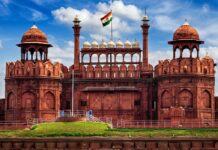[vc_row][vc_column][vc_column_text]
Those opposed to non-vegetarianism blissfully remain ignorant about the food chain, which is God’s (read nature if you are an atheist) scheme to maintain ecological balance. Quite often the issue becomes a hot topic of animated debate in social circles in the country. But of late, it has assumed political dimension. So much so that at times, the choice of food proves detrimental to one’s social mobility.
In a country with 70 percent meat eating population, non vegetarians are still treated like outcasts. Food could be a matter of personal choice, but not for many who follow vegetarianism as a religion. While extolling virtues of their choice, they hold non-vegetarians in sheer contempt.
If you are a vegetarian, you are most welcome in all social circles. But in case you happen to be a confirmed non vegetarian, you are most likely treated as a pariah in most Indian households.
Poor meat eaters, on the other hand, remain content by mocking at the vegetarians calling them ghaas-phoos khaane wale (consumers of hay).
Of late, vegetarianism has assumed a cult status with more and more people joining the bandwagon for reasons political rather than moral or ethical though none would admit it publicly. The sudden brouhaha on animal rights is bound to put meat eaters on the defensive. No matter how rationally you defend yourself, you can’t escape the stigma.
You might argue that non vegetarianism makes economic sense and that it is a necessary evil to maintain ecological balance. But none of your logic will cut much ice with the vegetarian minority ruling the country. Eventually you are going to be pronounced guilty of murder. No mitigating factor can absolve you of the guilt conscious.
The year 2014 was a turning point in the food politics of the country. People suddenly became discreet about their love for chicken tikka and mutton curry for fear of the stigma attached to meat eating. Like me, many people started observing strict confidentiality about their meat addiction which, for the political elite, is more abhorrent than alcoholism.
Going by the secrecy people maintain today about their food preference actual percentage of meat eating population could be much higher than the 70 percent official figure.
Against this backdrop, I, for one, stopped disclosing my carnivorous instinct without making sure that the person inquiring about my food habits is a non vegetarian himself.
Hence, when a female friend inquired about my food habit, I told her I was a shuddh shakahari – pure vegetarian. Upon this, my male colleague chipped in reminding me that I had biryani at his house.
Cornered, I had no option but to admit that I did. However, I made a clarification that I become vegetarian while eating vegetarian food and non-vegetarian when I take non-veg. My remark was followed by a roar of laughter in the office.
I further clarified, “I make distinction between veg and non-veg food, but treat all humans alike, neither vegetarian nor non-vegetarian. Everyone agreed to my contention. I then declared in a lighter vein: “But if anybody insists on calling him/herself a non vegetarian, I can’t withstand the temptation.”
My statement was followed by another round of laughter.
True to my principle, when one of my junior colleagues declared that he was a vegetarian, I asked him, with a tinge of irony, if I could have him for dinner. For a moment he stood still
trying to figure what I meant. As he kept staring at me blankly, I told him, with a twinkle in my eyes, “I prefer vegetarian food.”
Jokes apart, this veg-non veg debate sometimes assumes serious implications. If you are a self-avowed meat eater, you won’t stand a chance to rent an accommodation in a self declared vegetarian neighbourhood. You might even be treated like a pariah. They would say their religion would be spoilt with you around.
You might wonder how your food habit is going to affect others. But this is what India is all about, a wonderland. In the West, food choice reflects a person’s financial status, but in our
county it determines his/her social status.
Nevertheless, there are many noble souls in the midst of islands of vegetarianism who won’t mind whether you eat a veg or non veg, it won’t make any difference to them. One of them was the spouse of my boss. A strict vegetarian, the elderly lady used to prepare non vegetarian delicacies for the entire household.
Once when I visited them with my wife, my boss expressed his desire to taste south Indian curry prepared by my wife who they treated like a daughter. She readily agreed to the
proposition and headed to the kitchen.
Once in the kitchen, my wife started searching for the right utensils. On seeing her desperation, the elderly lady asked as to what she was looking for. My wife replied that she was looking for the utensils meant exclusively for preparing meat dishes. At this, the matriarch had a hearty laugh before disclosing that they make no such distinction in utensils.
I and my wife were pleasantly surprised as we knew most our north Indian neighbours make such a distinction among utensils as if the dishes in which meat is served would infect their vegetarian fare.
[/vc_column_text][/vc_column][/vc_row]
Disclaimer: We do undertake rigorous checks on content provided by contributors before publishing the same. If you come across some factual errors, kindly bring this into our notice and we shall review your objection and claim as per our policy and display correction credits and corrections on the article itself.
The opinion expressed in the article is of the writer. Writer is a freelance journalist/journalist based in Delhi




























